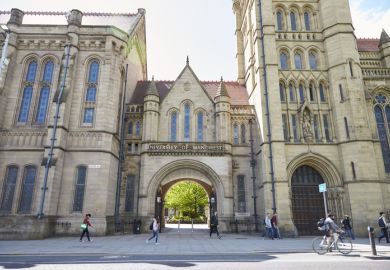The University of Manchester is assisting a police inquiry into whether a controversial research paper by one of its PhD students broke laws prohibiting the possession of child pornography, a parliamentary committee has heard.
Speaking at a House of Commons Education Committee hearing, Nalin Thakkar, the institution’s vice-president for social responsibility, confirmed that Manchester was working with the police as it investigated the actions of Karl Andersson, a Swedish first-year PhD student, whose recent paper in the Sage journal Qualitative Research described how he spent three months masturbating to images in Japanese comics depicting the sexual encounters of young boys.
Under UK laws, it is illegal to possess indecent images of children under the age of 18, including cartoon images as featured in the manga comics.
Professor Thakkar told MPs on 7 September that the university’s own investigation into Mr Andersson, whom it has suspended, had received conflicting accounts about where the research for the paper, subtitled “Using masturbation as an ethnographic method in research on shota subculture in Japan”, was carried out. In one answer, Mr Andersson claimed that his fieldwork had been undertaken entirely in Germany, where he was a master’s student at the time; but another account suggests that some of his research was done after he was funded for his PhD by Manchester.
“We have been given two different answers – we have relayed these to the police,” said Professor Thakkar, who added that Manchester was also conducting its own investigation into Mr Andersson and his PhD supervisor, Sharon Kinsella, who was thanked in the paper “for always encouraging me to go where my research takes me”.
However, Professor Thakkar said the supervisor had only become aware of the paper in February after it was approved for publication two months later. “As we understand it, she was presented with the paper after it was accepted and she gave it the nod,” explained Professor Thakkar, who stressed that the authoethnographic research had not been conducted under the auspices of Manchester.
Nonetheless, he admitted that the episode had highlighted a “blind spot” in terms of certain types of controversial research. There were, he added, “lessons for us to learn about the vetting of students before we take them on”, acknowledging that Mr Andersson’s history of publishing sexually suggestive pictures of young boys in gay publications in Sweden had not been known when he was enrolled as a PhD student.
Asked if he could see any potential benefit to taxpayers in pursuing the research area, Professor Thakkar responded: “Personally, I cannot see any benefit,” although he conceded that this was not his areas of expertise.
He also explained that an ethics committee had rejected Mr Andersson’s proposal for his PhD in June, raising concerns about the “design” of a project in which the student would undertake “observations of shota comics” including “semi-structured interviews” with users.
Professor Thakkar explained that “getting an unfavourable outcome [from an ethics committee] is very rare in university research”. However, some MPs were keen to know why these concerns had not been passed to police at the time – with Professor Thakkar responding that the proposed project did not involve the personal use of shota comics in the same way as his earlier research did.
Asked about Manchester’s concerns about the academic paper, which committee chair Robert Halfon described as “pretty bleak” and “genuinely disgusting”, Professor Thakkar said the university “completely understands and shares the deep concerns raised by the public”.
Register to continue
Why register?
- Registration is free and only takes a moment
- Once registered, you can read 3 articles a month
- Sign up for our newsletter
Subscribe
Or subscribe for unlimited access to:
- Unlimited access to news, views, insights & reviews
- Digital editions
- Digital access to THE’s university and college rankings analysis
Already registered or a current subscriber?










